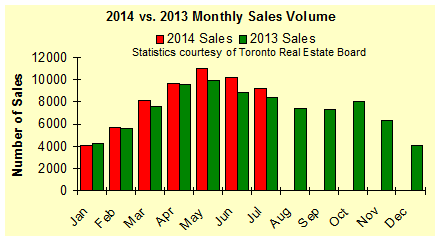Toronto Income Property Newsletter – March 2014
And away we go. Two weeks back we saw the first real spate of quality new inventory hit the market for the first time this year. Prior to that the listings were scant and there were very few attractive investment properties to consider. With such a limited supply, the majority of downtown properties were exceeding the asking the price and in a lot of cases, pre-emptive or “bully” offers were occurring. I will talk more on that in a bit. Hopefully now with more houses to choose from we will finally churn through some of this heightened demand.
As I write this, it is still freezing cold outside and I honestly believe this is a good part of the reason why the market has been so slow off the hop this year. I’m sure with a nice warm spring around the corner the market will level off to a degree.
Congratulations to all of our Olympic athletes on a stellar performance in Sochi and a Happy St. Patty’s Day to all of you.
– P.A.
What is a pre-emptive of bully offer?
In a hot market like we have been experiencing in Toronto, Sellers will often choose to “hold Back” the offer date, or in other words not look at offers until a certain predetermined time. This is done in order to try and get as many people through as possible to see their property and to try and create a bit of a buying frenzy. It allows for public open houses and extensive marketing to be done in order to attract as many people as possible to the property.
This procedure has become the norm in the Toronto real estate market in recent years. However, some buyer agents have begun to use a smart counter-strategy. A pre-emptive or “bully offer” is one registered prior to the scheduled date – often several days early – to be presented ASAP. The Listing Agent is obliged to present the offer to the Sellers. The ball is then in the Sellers’ court: do they take the ‘bird in hand’, or wait for the scheduled date in the hopes of getting competition and even more money? To be attractive to the Seller, the bully offer is typically for more money than the asking price, and often ‘firm’, meaning with no conditions attached. It often has a limited time period for the Sellers to decide.
If I show a property and then another agent submits a bully offer, the listing agent is obligated to let me know about it. Then my client has the opportunity to compete if they so desire. What is frustrating is when you turn up to an Open House on a Saturday afternoon with your client, (Saturday is always my busiest day with clients), and the house has already been sold. This has been happening a lot lately. It is my job to make sure that my clients understand that they need to be ready to go at a moment’s notice, and even though we think we may have a few days to do our diligence, the house could be sold at any time.
The Seller is allowed by law to use any tactic or device to try and get as much money as possible for their property. They are well within their rights to change the hold-back date and accept a bully offer. They often go $100K over the asking price so that’s why they are often considered. I have written and accepted bully offers for my clients, so I can’t really be too critical. I understand that buyers do get frustrated with multiple offers and bully offers, but this is the result of a real hot Sellers’ market. In a more balanced market, it is not likely that bully offers would occur.
Landlord Resources
We have some excellent landlord resources on our website (plex.ca). There are also some great landlord literature provided by CMHC. You can go to the Canada Mortgage and Housing Corportation’s Landlord page to gain access to the following valuable resources.
Understanding Private Rental Housing Investment in Canada
A recent study of the nature and extent of private rental housing investments in Canada.
Adapting Low-Rise Residential Buildings
A guide that helps landlords/property owners renovate buildings to create a barrier-free, three-storey walk-up apartment building. This guide was not designed to substitute for the National Building Code or local/municipal requirements.
Research Report: Aging Tenants in the Private Rental Market
This research study discovered how home owners and landlords of private rental housing are addressing the changing needs of their aging tenants.
Cleaning Up your House After a Flood
This small booklet explains how to examine, decontaminate and clean up a house after a flood. This is a useful resource for people who find themselves in this situation.
Clean-Up Procedures for Mold in Houses
This small booklet explains the basics of mold and how to clean it up in beds and bedding, clothing, carpets, drapes, upholstered furniture, walls, ceilings, uncarpeted floors and other household items. This resource is quite useful for people who have allergies to molds or find themselves living in a moldy space.
Rental Repair and Renovation in Canada
These key findings of the 1996 Statistics Canada study, Rental Repair and Renovation Expenditure Survey, were commissioned by CMHC.
Understanding Private Rental Housing Investment in Canada
This highlights booklet provides fascinating tidbits of data, such as “Canada has about 4 million rental housing units, some 85% owned by the private sector”. The reader can also find a few interesting tips, with “broad-strokes” insights into private rental housing in Canada.
Evictions: A Practical Guide to Residential Evictions in Ontario (2001)
Toronto CCH Canadian. ISBN 1551411466. Ontario
This guide takes a how-to, step-by-step approach to evictions. Complete with forms, this guide is current, making it extremely useful for Ontario landlords.
How to plan, finance and carry out capital expenditures (1989)
The Fair Rental Policy Organization of Ontario. CMIC #HD7288.85.C320452. Ontario.
This booklet explains how landlords can finance capital expenditures in their rental units from an accounting/bookkeeping point of view.
Landlording: a handy manual for scrupulous landlords and landladies who do it themselves, 9th ed. (2001)
El Cerrito, Calif.: Express. ISBN 0932956254 (pbk). United States.
This US publication has received rave reviews from readers, with the Chicago Tribune calling it “…the best property management book in the field.” As U.S. landlord-tenant law varies from Canadian, landlords will find most useful the areas of the book that deal with practical matters as opposed to strictly legal issues.
The Canadian Landlord’s Guide: Expert Advice for the Profitable Real Estate Investor (2010)
Wiley, ISBN 0470155272
A guide on how to become a successful landlord in Canada.
I also recommend that you take a look the Canadian Landlord Association website for even more resources.




